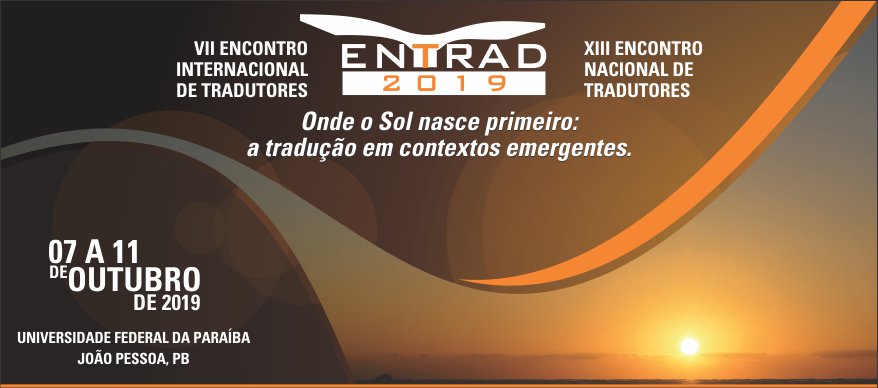Antes de se inscrever, leia as orientações AQUI
Mulheres em Tradução
Women in Translation
Luciana Carvalho Fonseca
USP
lucianacarvalhof@usp.br
http://lattes.cnpq.br/7061790632016950
John Milton
USP
jmilton@usp.br
http://lattes.cnpq.br/5756833764522214
Liana de Camargo Leão
UFPR
lianaleao@hotmail.com
http://lattes.cnpq.br/6436469744311118
Idiomas de trabalho | Work languages: Português, English, Español
Resumo: A tradução é “o ato mais íntimo de leitura”, em que “[uma tradutora se] rende ao texto quando traduz” e que, ao fazê-lo, “ganha permissão para transgredir a partir do traço do outro – antes da memória – nos lugares mais próximos do eu” (Gayatri Spivak). Pensar a tradução a partir do sujeito, – a partir da mulher que a realiza –, é observar quais as possíveis relações entre o agente de tradução e seu processo de produção. Este simpósio convida trabalhos que revelam ou refletem sobre as mulheres na tradução, abrangendo relações linguísticas, sociais, materiais, políticas, históricas, culturais, institucionais e profissionais, envolvendo a tradução escrita e oral. Entre os temas abarcados estão: as teorias feministas sobre a tradução, a tradução e a circulação do feminismo, os recortes raciais na tradução feita por mulheres, o papel das editoras feministas e suas políticas editorais para tradução, os estudos sobre obras escritas por mulheres e traduzidas por mulheres, as diferenças de gênero na profissão, formação, práticas profissionais e atuação no mercado, o financiamento de traduções feministas, as tradutoras na história e na historiografia da tradução, a representação das tradutoras na literatura e periódicos, biografias de mulheres tradutoras de poesia, literatura e teatro, práticas de autotradução, a retradução de obras consagradas por mulheres, a tradução engajada e a tradução ativista produzida por mulheres, a tradução feita por mulheres e a censura, a influência das traduções realizadas por mulheres na formação da literatura nacional, o papel das tradutoras na (re)tradução do cânone, bem como a exploração e investigação da ausência e do silenciamento das mulheres na tradução, entre outros temas pertinentes à relação mulher-tradução. Nesse sentido, entre as questões norteadoras dos trabalhos estariam: Quem era/é a tradutora? O que (não) foi traduzido por mulheres? Onde a tradução teve lugar? Quais eram as instituições envolvidas? Quem auxiliou a tradução? Por que a tradução foi realizada? Como a tradução foi feita? Como foi escolhida? Quando foi realizada a tradução? Para quem foi feita a tradução?
Palavras-chave: Tradutoras, Tradução e gênero, Tradução e mulheres
Abstract: Translation is “the most intimate act of reading,” and a translator “must surrender to the text” (Gayatri Spivak). In so doing, she “earns permission to transgress from the trace of the other – before memory – in the closest places of the self.” To think about translation from the perspective of the subject – the woman who performs it – is to delve into the relations between translation agent and her translation process. This symposium invites works that reveal or reflect on women in translation, covering linguistic, social, material, political, historical, cultural, institutional and professional relationships, involving written and oral translation. Among the topics covered are: feminist theories on translation, translation and circulation of feminism, race and ethnicity in translations by women, the role of feminist publishers and editorial policies for translation, studies on works written by women and translated by women, gender differences in the profession, training, professional and market practices, funding for feminist translations, translators in the history and historiography of translation, representation of women translators in literature and periodicals, biographies of women translators of poetry, literature and drama, self-translation practices, retranslations of the canon by women, engaged and activist translation produced by women, women translators and censorship, the influence of women’s translated works in the formation of national literature , the role of translators in (re)translating the canon, as well as discussions and investigations on the absence and silencing of women in translation, among other topics under the relations between women and translation. In this sense, questions that would guide proposals involve: Who was / is the woman translator? What was (not) translated by women? Where did the translation take place? Which institutions were involved? Who helped the translation? Why was the translation done? How was the translation done? How was it chosen? When was the translation done? Who was the translation for?
Keywords: Women translators, Translation and gender, Women in translation
Antes de se inscrever, leia as orientações AQUI
